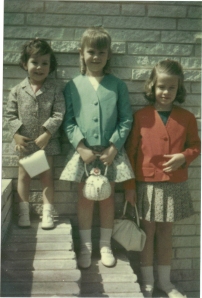As the oldest of four girls, I heard the question, “Who did this?”, a lot. “Where did that come from?” ran a close second, but never knocked “Who did this?” out of first place.
The question, of course, always led to pointing fingers and defensive whines. The words “…but she…” were thrown around quite a bit. I’m not saying those fingers were usually pointed at me…but my mother would.
Fast forward lots of years. It’s the late 80’s. MTV still played music videos and John Bradshaw was the darling of public television. Mr. Bradshaw wrote a book called “Healing The Shame That Binds You”, among others. He was featured prominently during pledge week. At the time, I was hoarding quarters in hopes of collecting enough to buy a box of Hamburger Helper, but I often dreamed of pledging and, when I did, I determined to do the magnanimous thing. I’d tell them to keep their silly old umbrella.
Bradshaw fascinated me for a number of reasons. He was good looking for one. And he had a great voice; a voice a father would have if you had that kind of father. You know the kind; the kind whose lap was yours for the taking, the kind that listened, the kind that comforted.
No, I didn’t have that kind either.
The thing I remember most when thinking of John Bradshaw, besides his delicious shock of salt and pepper hair, is the mobile. That’s what sucked me in, really; it was a simple thing. It might even have been made from a clothes hanger. Family members, represented by shapes cut from shiny paper, dangled from it. Bradshaw used the mobile to demonstrate that instability in one family member threw everyone else off balance. With a flick of his finger, he’d send one paper doll spinning. The rest followed suit in a crazy chaotic dance that demonstrated it didn’t matter who jumped first; in the end they were all hopelessly tangled up in their own strings.
Everyone loves a good whodunit…Who was the last one here? Who took the last paper towel? Who left the seat up? Who spilled the tea? Who moved the remote control? Who left the window down? And the classic…who let the dogs out?
Our society’s obsession with blame is the main reason I no longer talk politics. It’s impossible to make a comment, no matter how innocuous, without someone borrowing from my sisters and I; “But, he…”, “But, she….”, “But, they…” And we all know what happens next.
Mom gets the switch.
She never seemed to notice, but I did. Nothing good ever came from getting a switch. Despite her admonitions to the contrary, there was always lots of crying and, afterwards, Mom was red-faced and sweaty. We didn’t stop doing what she didn’t want us to do, we just did it better, more quietly, and with a heightened sense of accomplishment.
As the rare liberal living and working in a red sea of Bible-based Republicans, I’ve kept my head down since the partial government shut-down. (Even typing those words feels ridiculous…but I digress.) You can hear better with your head down, and what I hear is a lot of blaming. The paper dolls are dancing, and everyone is so busy pointing out who jumped first that no one noticed Mom going for the switch.
Maybe Ken Fisher watched John Bradshaw too. Fisher is the chairman of the Fisher House Foundation. On Wednesday, Fisher House committed to providing death benefits and transportation to family members of soldiers killed in the line of duty. Ken Fisher didn’t ask “who”. He kept his fingers to himself and, instead of muddying the waters with feckless accusations; he provided a solution to a problem caused by lesser men with bigger titles and lots to lose.
You can learn more about Fisher House Foundation here: http://www.fisherhouse.org/
Photo credit: http://www.diabetesmine.com/wp-content/uploads/2012/09/pointing-finger.jpg






 Of course, I see God everyday. What more perfect evidence is there of God’s presence than a bird? These marvelous creatures, who carry everything necessary for life in a tiny feathered bundle that defies gravity, effortlessly. What better proof could there be of the Divine?
Of course, I see God everyday. What more perfect evidence is there of God’s presence than a bird? These marvelous creatures, who carry everything necessary for life in a tiny feathered bundle that defies gravity, effortlessly. What better proof could there be of the Divine?



